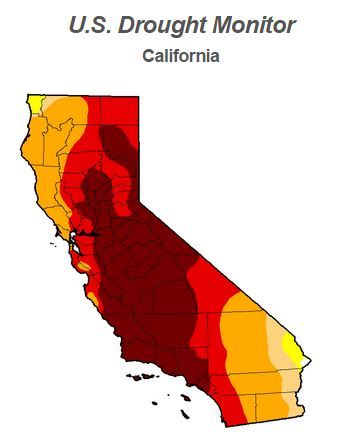CA could tap new water regulations
by James Poulos | February 26, 2015 4:30 am
 Struggling to get ahead of California’s continuing drought, officials in Sacramento have turned their attention to proposals that would crack down on water use. The latest option focused[1] on the hospitality industry, where customers could be required to opt in for free drinking water, fresh linens and similar resource-intensive items.
Struggling to get ahead of California’s continuing drought, officials in Sacramento have turned their attention to proposals that would crack down on water use. The latest option focused[1] on the hospitality industry, where customers could be required to opt in for free drinking water, fresh linens and similar resource-intensive items.
Although some lawmakers advocated new funds for projects that could pump up the Golden State’s access to potable water, and some municipalities have considered revisiting old methods to do so, the state’s demand has threatened to outstrip supply.
Under chairwoman Felicia Marcus, the State Water Resources Control Board has seen some success in curtailing water use. Nevertheless, the Associated Press reported[2], in a recent hearing Marcus and the board signaled a determination to restrict Californians’ consumption even more:
“The board has the sweeping power to define when water use is unreasonable, and it could eventually expand the definition to include using drinking water to maintain golf courses and cemeteries. Marcus said the board would likely take smaller steps first, such as prohibiting decorative outdoor water fountains.”
So far, the board has used mandatory data reporting requirements to measure the impact of restrictions on lawn watering and car washing that it first imposed over the summer. CBS Sacramento reported[3], “More than 400 local water departments must report their residential per-capita water monthly water use compared with the year before.”
As the network noted, although those restrictions were pegged to an April expiration date, the board indicated it will consider renewing them as part of the expanded rules that could include the new table water and hotel linen regulations.
Alternate approaches
Meanwhile, in the California Legislature, a new proposal has been floated to put more funds into capturing stormwater for residential use. As Sacramento’s Capital Public Radio confirmed[4], some stormwater funding already made its way into California’s landmark water bond, Proposition 1[5], which voters passed last November. The bond was a top priority for Gov. Jerry Brown.
But State Sen. Bob Hertzberg, D-Van Nuys, argued for an expansion of those plans. “We spend so much money and have such environmental impact by moving water around the state, when right in front of our noses there’s a lot of opportunity to capture it,” he told CPR. “So we’re looking at best practices and trying to figure out new policies we can develop to make that happen.”
One approach that hasn’t made it onto the statewide agenda, however, shows more immediate promise: desalination. A relatively old technology, the process of purifying ocean water started returning to favor recently among some cities and scientists.
Coastal cities including Santa Barbara, Carlsbad and Huntington Beach have all turned their attention to using desalination plants, the Wall Street Journal reported[6]. Though costly — desalination consumes a great deal of electricity — the plants have offered a fairly quick emergency fix in the past.
In Santa Barbara’s case, noted the Journal, “desalinated water will cost about a third more than the city’s imported freshwater supplies.” But “Mayor Helene Schneider said other options, including more conservation, have been exhausted for the city of 90,000.”
Daunting trend lines
Despite Californians’ success in approaching the state’s water conservation goals, drought projections have officials and analysts worried that the effort won’t be able to keep pace with the state’s long-term population growth.
Though on track to lower consumption 20 percent by 2020, the Sacramento Bee reported[7], water agencies determined that in 15 years use will have increased 16 percent. The California Department of Finance, the Bee noted, estimated that the state population will grow by 14 percent over the same period — rising to 44 million residents, demanding an additional 1 million acre-feet of water.
- focused: http://trib.com/business/california-weighs-new-drought-rules-at-restaurants-hotels/article_f5ffd934-389d-5b28-a757-cfde89e3f3fc.html
- reported: http://trib.com/business/california-weighs-new-drought-rules-at-restaurants-hotels/article_f5ffd934-389d-5b28-a757-cfde89e3f3fc.html
- reported: http://sacramento.cbslocal.com/2015/02/03/water-board-meets-gov-browns-water-use-target/
- confirmed: http://www.capradio.org/articles/2015/02/24/california-lawmakers-will-examine-ways-to-capture-stormwater/
- Proposition 1: http://www.voterguide.sos.ca.gov/en/propositions/1/
- reported: http://www.wsj.com/articles/california-turns-to-the-ocean-for-1424215351
- reported: http://www.sacbee.com/news/local/environment/article10311635.html
Source URL: https://calwatchdog.com/2015/02/26/ca-could-tap-new-water-regulations/